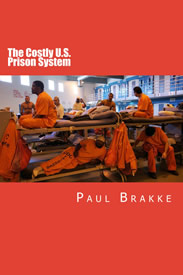
In my book: The Costly U.S. Prison System, I describe how the U.S. prison system costs billions more than necessary because of the high incarceration rate and long prison terms for non-violent offenders.
Unfortunately, this tendency of a convicted criminal to return to crime, known as recidivism, is common.
But with reduced sentences, along with some help with training, ex-cons could become productive citizens and not return to crime. Also, their families could be spared the collateral damage resulting from their incarceration, such as a loss of income and a break-up of the family.
Here I want to provide 12 suggestions for what we can do now to fix the prison system by reducing recidivism, increasing the safety and security of communities, and saving money for taxpayers as a result. These suggestions are drawn from the conclusions of The Costly U.S. Prison System.
Initially, we should make the following changes in sentencing practices:
1. Reduce recidivism by no longer sending technical violators of parole back to prison.
2. Release more prisoners who are incarcerated for minor crimes and are at the lowest risk for recidivism.
3. Stop sentencing minor drug violation offenders to prison.
Next, we should seek these changes in legislation and policies
4. Reduce mandatory minimum sentencing guidelines in order to decrease the length of sentences.
5. Provide greater funds for indigent defense.
6. Transfer financial accountability for imprisonment from the states to the counties, so that the counties will hold the prosecutors they pay accountable for any over-incarceration they generate. This way, if counties have to pay for over-incarceration, they won’t let their prosecutors imprison so many prisoners.
7. Set up sentencing commissions in each state to better assess sentencing guidelines and reduce unnecessary incarcerations for less serious crimes.
8. Establish mandatory treatment centers for prisoners with substance abuse problems instead of housing them in prison. Require such convicts to participate in these treatment programs, monitor compliance, and provide appropriate penalties for those who don’t comply, including a return to prison.
9. Reform the bail bond system to eliminate or reduce the costs for defendants, so they don’t spend time in jail because they can’t afford a bond.
Additionally, make these changes to increase alternatives and reduce costs:
10. Introduce private prison contracts which pay for successful prisoner reentry results rather than for prisoner stays.
11. Populate mental hospitals and psych wards with properly trained staff, so mentally ill prisoners can be sent there as an alternative to jail and prison.
12. Appoint prosecutors instead of electing them, so they will not be swayed in doing their job by political or public opinion considerations.
Paul Brakke is a scientist based in the Little Rock, Arkansas area. He became interested in studying the criminal justice system when his life was turned upside down after his wife was falsely accused of aggravated assault for trying to run some kids over with her car, since the kids and some neighbors wanted her out of the neighborhood.
Eventually, they were forced to move as part of a plea agreement, since otherwise, Brakke’s wife faced a possible 16 year jail sentence if the case went to trial and she lost.
He has previously told his wife’s story in American Justice?, along with a critique of the criminal justice system. That book’s website is at americanjusticethebook.com.
He founded American Leadership Books after he began investigating the criminal justice system in more depth. Thus far, five more of his books have been published by American Leadership Books.




